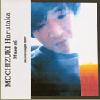 Despite some of the high energy alto sax improvisation here, this release by Japanese multi-instrumentalist Mochizuki Harutaka feels like the work of a sensitive soul. The gentle cover shot of Harutaka, with what looks suspiciously like a Tequila sunrise in the foreground, and some touching liner notes by post-folker Dredd Foole give the physical product an intimate, homespun feel.
Despite some of the high energy alto sax improvisation here, this release by Japanese multi-instrumentalist Mochizuki Harutaka feels like the work of a sensitive soul. The gentle cover shot of Harutaka, with what looks suspiciously like a Tequila sunrise in the foreground, and some touching liner notes by post-folker Dredd Foole give the physical product an intimate, homespun feel.
The plaintive bare-bones jazz melancholy of the opening piano/voice piece "Song" reveals Harutaka's unexpectedly sensitive vocal, his voice recorded as if heard through electric cotton wool. This almost traditional use of western balladry is unexpectedly repeated on the closing piece (also titled "Song"); to say these pieces are gorgeously fragile would be to utterly undersell their bookending effect. There's a pretty strong loner vibe coming off this record, the voice of someone refusing conventions and effortlessly matching their musical vision with something magical. Muse Ni sees Harutaka appear like a positive flipside to the dark desolation of a player like Jandek, carrying hope instead of despondency. These songs may be the album's double hearted core, despite their positions, but it's the three alto sax pieces that show the experimental reach of Harutaka.
"Alto Sax Two" may lack the muscle of other rowdier sax damaging players, but he seems more concerned with mapping out the instruments edges rather than following any internal routes. Running on wide-eyed virgin energy he combs his way through a version of everything-Nmperign-never-thought-of in a single three-and-a-half-minute burst. The short sharp backwards blasts of "Alto Sax Three" sound like they're sucked from the marrow of music rather than blown through reeds and metal. It's the final part of sax work which seems the most conventional in terms of free jazz playing: a swooping collection of notes shorn loose of the instrument. It's like hearing one side of a conversation, Harutaka responding with melody and fire to a quartet that doesn't exist outside of his head. This is a record that makes you dream about his next release.
samples:
Read More

